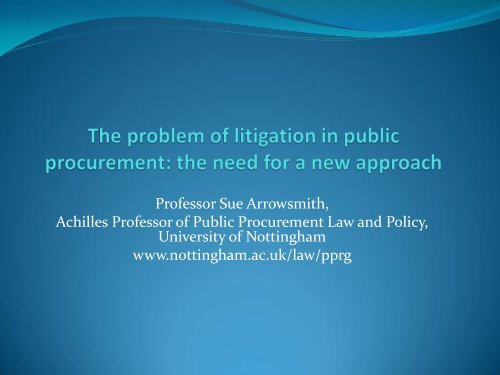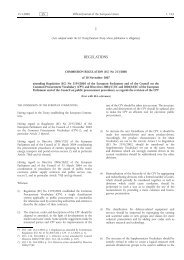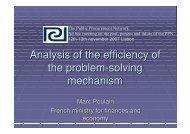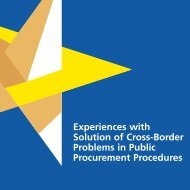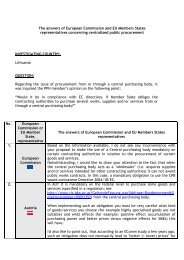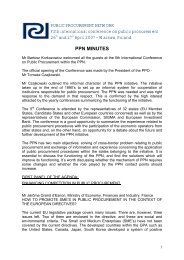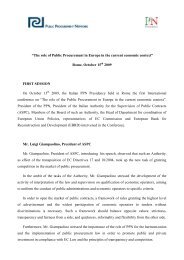by Sue Arrowsmith - Public Procurement Network
by Sue Arrowsmith - Public Procurement Network
by Sue Arrowsmith - Public Procurement Network
You also want an ePaper? Increase the reach of your titles
YUMPU automatically turns print PDFs into web optimized ePapers that Google loves.
Professor <strong>Sue</strong> <strong>Arrowsmith</strong>,<br />
Achilles Professor of <strong>Public</strong> <strong>Procurement</strong> Law and Policy,<br />
University of Nottingham<br />
www.nottingham.ac.uk/law/pprg
Summary<br />
• Litigation is a problem<br />
• Two-pronged approach needed:<br />
• Simplification of the legal rules<br />
• A different approach to enforcement<br />
• Supplier remedies limited to cases where there is negligence<br />
and a likely impact on the decision<br />
• Alternative national enforcement methods?
The functions of supplier remedies<br />
• Deter violations<br />
• Correct violations<br />
• Interpretation<br />
• In national courts<br />
• Through CJEU
Why legal remedies for suppliers?<br />
• Legal remedies for suppliers can:<br />
• Give suppliers confidence and control<br />
• Encourage supplier participation<br />
• Encourage focus on important areas
The problems of litigation<br />
• Disruption to procurement<br />
• Financial costs for contracting authorities<br />
• Problems for other suppliers in the award procedure –<br />
including the winning supplier<br />
• Can deter participation <strong>by</strong> good suppliers
The problems of litigation<br />
• Settlement of complaints <strong>by</strong> promises of future contracts<br />
• “Over-compliance”:<br />
• purchasers are concerned more with complying with technical rules<br />
than value for money, and make the procedure unnecessarily<br />
bureaucratic<br />
• affects value for money and efficiency of the procedure, and<br />
attraction of working in public procurement
A better balance between costs and<br />
benefits of supplier litigation?<br />
• Simplification of the legal rules<br />
• Reform of the supplier remedies system and focus on<br />
alternative approaches<br />
• Would:<br />
• Reduce many of the problems mentioned<br />
• Preserve most of the benefits of supplier enforcement<br />
• Enhance enforcement in some respects
Simplification of the legal rules<br />
• Law is too difficult to apply and litigation excessive<br />
because of:<br />
• Complexity of material<br />
• Volume of material<br />
• Low quality of legislation (poor drafting, inconsistency between<br />
regimes etc)<br />
• Low quality and unpredictable nature of CJEU decisions<br />
• Uncertainty (because of above and because some issues not dealt<br />
with)<br />
• This fact underlies the rule that cannot deny damages<br />
because there were other errors in the award<br />
procedure that would require a re-tender
Simplification of the legal rules<br />
• More detailed rules will not solve these problems<br />
• Volume and complexity of material is increased<br />
• Some uncertainty removed - but more created and new issues<br />
emerge
Simplification of the legal rules<br />
• Single directive to apply to all covered entities and<br />
activities, including concessions<br />
• Should replace:<br />
• <strong>Public</strong> Sector Directive 2004/18<br />
• Utilities Directive 2004/17<br />
• Defence and Security Directive 2009/81<br />
• The proposed directive on concessions
Simplification of the legal rules<br />
• Should be based on Utilities Directive 2004/17<br />
• Should be some amendments e.g.:<br />
• Need to clarify can consider whole life cycle, including production impacts<br />
(in Commission proposal)<br />
• Deal with “Lianakis” issue (in Commission proposal)<br />
• Exception for framework agreements (hybrid between Directive 2004/17 and<br />
Directive 2004/18?)<br />
• Electronic auction rules need amending to allow negotiation after tenders,<br />
to align with general rules<br />
• Make the “dynamic” purchasing system into a truly dynamic one <strong>by</strong><br />
removing the notice and tender for individual purchases<br />
• Will also give flexibility:<br />
• Free use of the negotiated procedure with a call for competition<br />
• Use of mandatory qualification systems<br />
• Use of qualification systems and PINs to advertise<br />
• No defined list of evidence that can be required for suppliers
Simplification of the legal rules<br />
• Simplification<br />
• One set of rules instead of 4 and some bits<br />
• No need to define boundaries between regimes (should have<br />
same thresholds for all “regimes”)<br />
• No difficulty in fitting together<br />
• Less to know for those working with more than one regime<br />
• Less detail than most of the current rules
Simplification of the legal rules<br />
• See further: S. <strong>Arrowsmith</strong> “Modernising the EU’s<br />
<strong>Public</strong> <strong>Procurement</strong> Regime: a Blueprint for Real<br />
Simplicity and Flexibility” (2012) 21 P.P.L.R. 71-82<br />
• Text available at www.nottingham/ac/uk/law/pprg<br />
(publications)
Supplier remedies: a different approach<br />
• Remedies should be required under EU law only when:<br />
• Manifest error of fact or commercial judgment or<br />
application of the law (negligence)<br />
• E.g remedy for not advertising a contract only when it is clear<br />
the law required an advertisement<br />
• Currently cannot require fault: Case C-314/09, Stadt Graz v<br />
Strabag<br />
• Burden of showing manifest error/negligence should be<br />
on the supplier?
Supplier remedies: a different approach<br />
• Remedy should not be required when the breach is not<br />
likely to have had an impact on the position of the<br />
supplier<br />
• Burden should be on contracting authority to show<br />
impact not likely?
How would these changes to remedies affect the<br />
functions of the supplier remedy system?<br />
• Deterrence<br />
• Would still deter most breaches – but would reduce excessive<br />
caution<br />
• E.g. production criteria as accepted in Case C-368/10, Commission v<br />
Netherlands (Fair Trade case)<br />
• Correction of breaches<br />
• Would limit this function but only in a few cases<br />
• Interpretation<br />
• Would reduce interpretation function<br />
• May need other approaches to this to replace national-level<br />
supplier litigation e.g. national advisory body (Commission<br />
could still bring CJEU proceedings)
How would these changes to remedies affect the<br />
functions of the supplier remedy system?<br />
• Would not significantly affect supplier confidence in<br />
the system
A role for attestation?<br />
• Attestation = independent accreditation that a procuring<br />
entity follows the EU procurement rules in its policies and<br />
practices<br />
• Formerly an option for utilities under the Utilities Remedies<br />
Directive<br />
• Could be an additional enforcement system to supplier<br />
remedies, that would make limited supplier remedies more<br />
acceptable<br />
• Could be:<br />
• Mandatory for all regulated entities alongside reduced<br />
supplier remedies or<br />
• Option for regulated entities/Member States that would<br />
entail more limited supplier remedies regime


